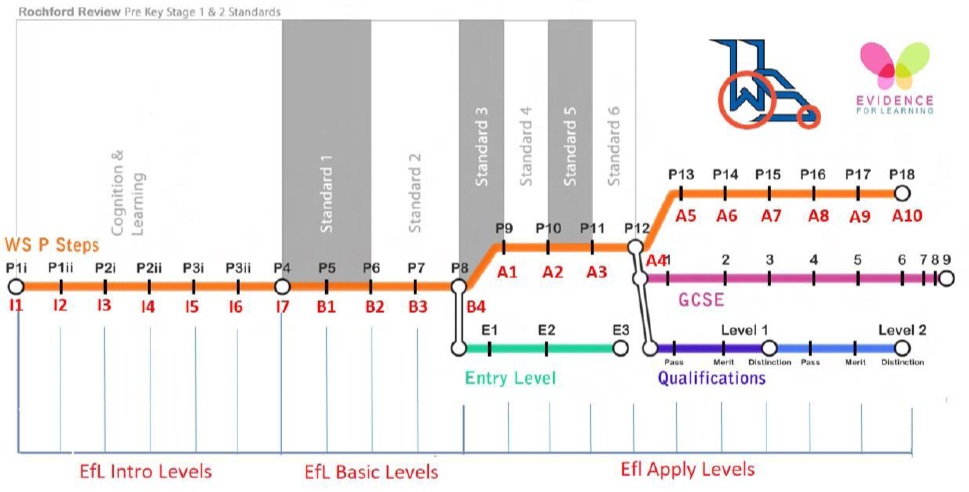- The principle of assessment is to check and identify what a child understands and what they need to learn next.
- This is done on a daily and lesson by lesson basis and will be a combination of verbal and written assessments as part of a formative or summative assessment process.
- Progress is also checked on a termly basis at which point progress data will be collected on each student in subjects across the board.
- Targets are set for the end of each year and end of each Key Stage and these will be based on prior attainment and teacher judgement and may not follow a formal linear flightpath with our learners.
- Some pupils will undertake tests, exams and topic tests as appropriate during the academic year.
- Every child will receive a written report during the year surrounding their progress and there will also be data shared with parents via WEDUC at two points during the year so that parents and learners are aware of in year progress as they move through the school.
- Parents have two parents evening per year they can attend to check on their child’s progress and ask any questions that they may have around the progress of their child.
- The school uses its own assessment system and frameworks that it has created based on Intro / Basic and Apply levels. These are also closely linked and equivalent to the previous Wilson Stuart P Steps
With the removal of P levels the Government announced that schools need to create their own assessment systems involving the following principles:
- Give reliable information to parents about how their child, and their child’s school, is performing.
- Help drive improvement for pupils and teachers.
- Make sure the school is keeping up with external best practice and innovation.
What is Evidence for learning and how does it link to Wilson Stuart Progress Steps?
KS1 – KS4
The new assessment system utilises a range of subject and pathway specific frameworks that utilise the Evidence for Learning (EfL) programme that provide staff and students with a means to track progress and attach evidence in the form of a learning journal.
- The frameworks and statements used very closely follow the previous WS P Steps that were designed several years ago to be on one continuum and to be simpler for parents to understand the progress of a child.
- The new frameworks incorporate the original P levels at the lower end and stretches up to the new Curriculum so we challenge every child regardless of ability. From Intro 1 (P1i) to Apply 10 (P18).
- It also crosses over past assessment systems so rough comparisons can be made when we moderate with other schools.
- Cognition level / Age appropriated learning is also mapped into the scale. The Government wants parents to know the cognition age a child is working at.

In addition to the academic level that the student is working at we also collate evidence and track progress against a students Personal Learning Goals (PLGs) that mirror student EHCP targets. This is qualitative assessment linked to EHCPs and skills based learning.
It utilises a software company Evidence for Learning (EfL) to record the assessment data online. We record lesson evidence to check our staff are correct with their judgements and this evidence will form the basis of regular moderation.
PMLD
- We have a separate curriculum area to record learning in our Profound and Multiple Learning Difficulty Classes (PMLD classes) so we can monitor small or tiny steps of progress with forensic detail through Routes for Learning
- The progress of our PMLD learners is closely mapped and evidenced also through EfL and utilises the ‘Engagement model’ to track progress.
EYFS
- The EYFS assessment system also utilises EfL to track progress against each of the EYFS strands e.g Physical development, Communication and Language etc.
- Students are assessed across the bands and will be internally levelled within each band as Emerging / Emerging + / Developing / Developing + and Secure.
- The framework statements are used as key performance indicators for each band
Sixth Form
- 6th form assessment is slightly different in that students are assessed against the qualifications that they are taking e.g PTA, Equals, ASDAN etc. Progress within individual units and courses will be tracked and monitored periodically towards the final qualification outcome.
- In addition to this 6th form will also have PLG evidence collated that demonstrates progress in skills / qualities linked to Preparing for adulthood and EHCP targets.
Data Analysis at Wilson Stuart
Assessment data is collated and analysed using a package called Insights for learning. This data analysis tool runs alongside EfL and enables staff to analyse data so that necessary interventions can be put in place or best practice shared.
Insights is a valuable tool that pulls together information provided so that this can be communicated to students and parents/ carers using a combination of spreadsheets and charts.

